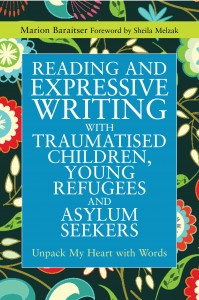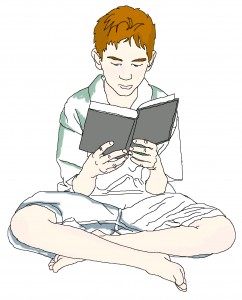 Marion Baraitser demonstrates the power of writing with traumatised children and young people. Marion’s book ‘Reading and Expressive Writing with Traumatised Children, Young Refugees and Asylum Seekers: Unpack My Heart With Words’ is available now from the JKP website.
Marion Baraitser demonstrates the power of writing with traumatised children and young people. Marion’s book ‘Reading and Expressive Writing with Traumatised Children, Young Refugees and Asylum Seekers: Unpack My Heart With Words’ is available now from the JKP website.
On the value of writing with traumatised young people:
When disturbed young people have read aloud together a strong text, talked about it with a practiced facilitator in a roomful of trusted community members, discussing characters and subjects that concern their own lives, and then written about it, it can transform their idea of themselves and of their future lives. They are better able to externalize self-hood so they can exist in the world, feeling that their internal being has connected to the outside world through books, in some profound way, a form of ‘being-in-development’, a process of growing and changing the many selves they can uncover by this process. The facilitator brings energy, optimism, warmth and responsiveness, even inspiration, or at least motivation or affirmation, to each session.
Here is Amina on the value of writing in helping her to heal:
Writing is helping me to put down memories, different perspectives, to try to find the line… Talking doesn’t do this. When I write I am having a relationship with my journal. Writing is like having a conversation with yourself. I tend to be more honest… pick up on things that lie deeper. I love myself, in writing… I am lucky to be here… I am lucky to be alive… You must keep going and finding yourself, at the same time staying true to yourself… even though you cannot forget where you started from.
How reading great books together can change lives:
The Nigerian writer Ben Okri, who holds childhood memories of civil war in Nigeria, of his schooling in Lagos 400 miles from his family and of how, on reaching England, he lived rough, by his wits, homeless and miserable. He went to London because of Dickens and Shakespeare, but he also loved African writers like Chinua Achebe and Wole Soyinka. ‘Literature doesn’t have a country. Shakespeare is an African writer… Dickens’ characters are Nigerians.’ (Okri, 1992) As the young people read aloud in the company of a facilitator and a like-minded group, they become the writer, they are taken out of themselves, and if the writer is worth his salt, that encompasses a whole new set of dimensions that can change the way they regard life and their place in it.
